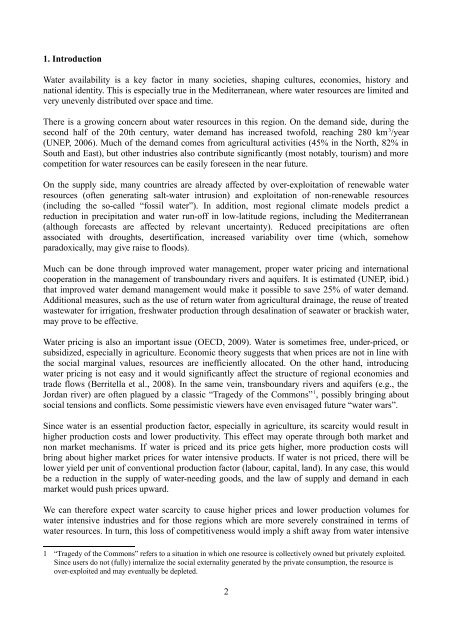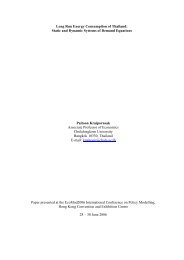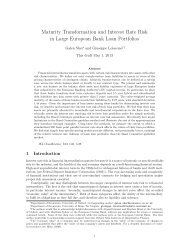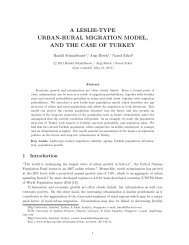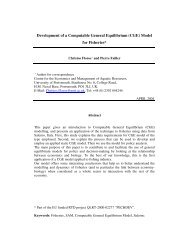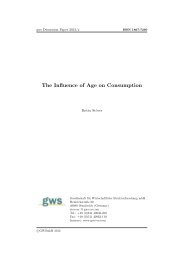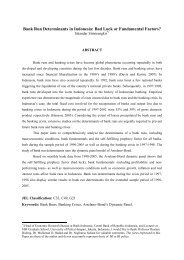Water Scarcity and Virtual Water Trade in the ... - Ecomod Network
Water Scarcity and Virtual Water Trade in the ... - Ecomod Network
Water Scarcity and Virtual Water Trade in the ... - Ecomod Network
You also want an ePaper? Increase the reach of your titles
YUMPU automatically turns print PDFs into web optimized ePapers that Google loves.
1. Introduction<strong>Water</strong> availability is a key factor <strong>in</strong> many societies, shap<strong>in</strong>g cultures, economies, history <strong>and</strong>national identity. This is especially true <strong>in</strong> <strong>the</strong> Mediterranean, where water resources are limited <strong>and</strong>very unevenly distributed over space <strong>and</strong> time.There is a grow<strong>in</strong>g concern about water resources <strong>in</strong> this region. On <strong>the</strong> dem<strong>and</strong> side, dur<strong>in</strong>g <strong>the</strong>second half of <strong>the</strong> 20th century, water dem<strong>and</strong> has <strong>in</strong>creased twofold, reach<strong>in</strong>g 280 km 3 /year(UNEP, 2006). Much of <strong>the</strong> dem<strong>and</strong> comes from agricultural activities (45% <strong>in</strong> <strong>the</strong> North, 82% <strong>in</strong>South <strong>and</strong> East), but o<strong>the</strong>r <strong>in</strong>dustries also contribute significantly (most notably, tourism) <strong>and</strong> morecompetition for water resources can be easily foreseen <strong>in</strong> <strong>the</strong> near future.On <strong>the</strong> supply side, many countries are already affected by over-exploitation of renewable waterresources (often generat<strong>in</strong>g salt-water <strong>in</strong>trusion) <strong>and</strong> exploitation of non-renewable resources(<strong>in</strong>clud<strong>in</strong>g <strong>the</strong> so-called “fossil water”). In addition, most regional climate models predict areduction <strong>in</strong> precipitation <strong>and</strong> water run-off <strong>in</strong> low-latitude regions, <strong>in</strong>clud<strong>in</strong>g <strong>the</strong> Mediterranean(although forecasts are affected by relevant uncerta<strong>in</strong>ty). Reduced precipitations are oftenassociated with droughts, desertification, <strong>in</strong>creased variability over time (which, somehowparadoxically, may give raise to floods).Much can be done through improved water management, proper water pric<strong>in</strong>g <strong>and</strong> <strong>in</strong>ternationalcooperation <strong>in</strong> <strong>the</strong> management of transboundary rivers <strong>and</strong> aquifers. It is estimated (UNEP, ibid.)that improved water dem<strong>and</strong> management would make it possible to save 25% of water dem<strong>and</strong>.Additional measures, such as <strong>the</strong> use of return water from agricultural dra<strong>in</strong>age, <strong>the</strong> reuse of treatedwastewater for irrigation, freshwater production through desal<strong>in</strong>ation of seawater or brackish water,may prove to be effective.<strong>Water</strong> pric<strong>in</strong>g is also an important issue (OECD, 2009). <strong>Water</strong> is sometimes free, under-priced, orsubsidized, especially <strong>in</strong> agriculture. Economic <strong>the</strong>ory suggests that when prices are not <strong>in</strong> l<strong>in</strong>e with<strong>the</strong> social marg<strong>in</strong>al values, resources are <strong>in</strong>efficiently allocated. On <strong>the</strong> o<strong>the</strong>r h<strong>and</strong>, <strong>in</strong>troduc<strong>in</strong>gwater pric<strong>in</strong>g is not easy <strong>and</strong> it would significantly affect <strong>the</strong> structure of regional economies <strong>and</strong>trade flows (Berritella et al., 2008). In <strong>the</strong> same ve<strong>in</strong>, transboundary rivers <strong>and</strong> aquifers (e.g., <strong>the</strong>Jordan river) are often plagued by a classic “Tragedy of <strong>the</strong> Commons” 1 , possibly br<strong>in</strong>g<strong>in</strong>g aboutsocial tensions <strong>and</strong> conflicts. Some pessimistic viewers have even envisaged future “water wars”.S<strong>in</strong>ce water is an essential production factor, especially <strong>in</strong> agriculture, its scarcity would result <strong>in</strong>higher production costs <strong>and</strong> lower productivity. This effect may operate through both market <strong>and</strong>non market mechanisms. If water is priced <strong>and</strong> its price gets higher, more production costs willbr<strong>in</strong>g about higher market prices for water <strong>in</strong>tensive products. If water is not priced, <strong>the</strong>re will belower yield per unit of conventional production factor (labour, capital, l<strong>and</strong>). In any case, this wouldbe a reduction <strong>in</strong> <strong>the</strong> supply of water-need<strong>in</strong>g goods, <strong>and</strong> <strong>the</strong> law of supply <strong>and</strong> dem<strong>and</strong> <strong>in</strong> eachmarket would push prices upward.We can <strong>the</strong>refore expect water scarcity to cause higher prices <strong>and</strong> lower production volumes forwater <strong>in</strong>tensive <strong>in</strong>dustries <strong>and</strong> for those regions which are more severely constra<strong>in</strong>ed <strong>in</strong> terms ofwater resources. In turn, this loss of competitiveness would imply a shift away from water <strong>in</strong>tensive1 “Tragedy of <strong>the</strong> Commons” refers to a situation <strong>in</strong> which one resource is collectively owned but privately exploited.S<strong>in</strong>ce users do not (fully) <strong>in</strong>ternalize <strong>the</strong> social externality generated by <strong>the</strong> private consumption, <strong>the</strong> resource isover-exploited <strong>and</strong> may eventually be depleted.2


